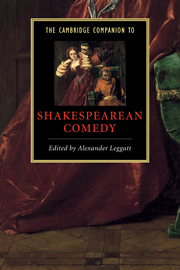Book contents
12 - Matters of state
from Part 2 - Shakespearean comedy
Published online by Cambridge University Press: 28 May 2006
Summary
Shakespeare's comedies touch on “matters of state” in two ways: the workings of law or the exercise of authority may give them a threatening or problematic edge; and, despite their exotic settings and fantastic actions, some of the comedies also bear the impress of the political conditions and anxieties of early modern England. Four plays – The Comedy of Errors, The Merchant of Venice, Measure for Measure, and The Tempest – turn dramatically on legal or political questions. In three of them, persons appear under guard or in chains, and death sentences impend; The Tempest employs the invisible or virtual chains of Prospero's magic, and death is a possible though unspoken penalty for his traitorous brother. All four plays climax in scenes of trial or judgment. In all, the principle of mercy or the bounty of fortune eventually overrides or skirts or deflects the rigors of law – at least on the face of it, and at least for some persons. Yet both justice and mercy prove questionable, through their arbitrariness, their incompleteness, or their very theatricality. The same four plays, like most Shakespearean comedies, are set in remote or fabulous realms – Ephesus, Venice, Vienna, and “an uninhabited island” somewhere between Tunis and Naples – where things are sometimes delightfully and sometimes disturbingly different. But these places would also have had a familiar aspect for Elizabethan and Jacobean playgoers. They are versions of London or England, or of their possible futures, and their dukes shadow England's rulers, or their menacing foes and rivals. No less than modern audiences and critics, Shakespeare's original audiences were alert to the political resonances of plays – their “application,” as it was called. These four comedies offer ample materials for the practice of “application.”
- Type
- Chapter
- Information
- The Cambridge Companion to Shakespearean Comedy , pp. 198 - 214Publisher: Cambridge University PressPrint publication year: 2001



